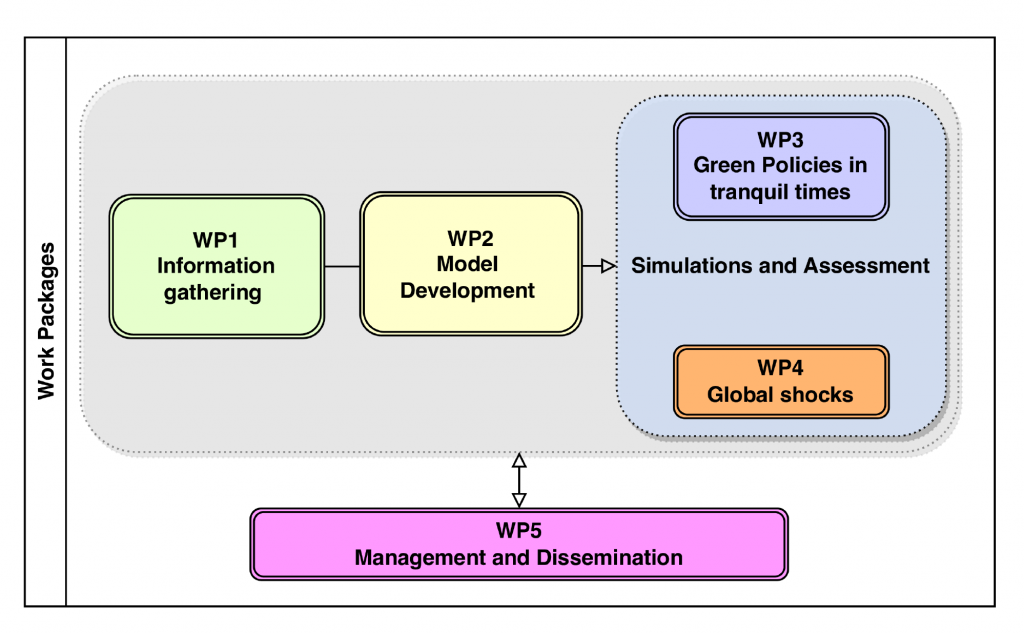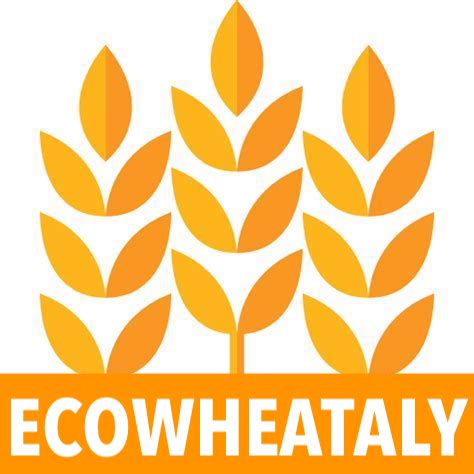The ECOWHEATALY project will be organized in 5 Work Packages (WPs): 4 technical WPs (WP1-4) and 1 support WP (WP5), as displayed in figure.

WP1: Setting the scene: information gathering
Task 1.1
Traditional and green economy policies framework, farm management, test farms selection. The task is devoted to gathering information and data on the following points about the Italian wheat production system: i) the features of the local farm management, such as the type of farms (small/big, traditional/organic), ii) the list of national and EU regulations in terms of external inputs usually used (when, how, how much), iii) historical data on wheat production and corresponding level of environmental sustainability. The FADN database is extraordinarily rich in terms of data, and it will have a crucial role in performing this task.
This task will be devoted to classifying the farms reported in the FADN according to the care they take for the environmental and natural resources.
Task 1.2
Life Cycle Assessment (LCA) setup for wheat production. In this task, the team will go through the four standard phases of LCA (goal and scope definition, inventory analysis, impact assessment, and interpretation) to set up the methodology for the wheat production system. The existing literature and the available data in FADN will be revised to perform this task. The team will evaluate the various computation methods (International Reference Life Cycle Data System (ILCD), Intergovernmental Panel on Climate Change (IPCC), ReCiPe) and the possibility to use source software such as openLCA or SimaPro.
WP2: ECOWHEATALY model development
Task 2.1
The GEM (Global Economic Model adaptation) for wheat is a computational model, already coded and ready to be used (https://github.com/gfgprojects/cms_wheat) (Giulioni et al 2019). The present version of the model accounts for a world geographic partition based on sub-continental areas or important wheat producer countries and Italy is included in the Southern-Europe region.
This task concerns the adaptation of the GEM that will be made in such a way that the model could be used to investigate Italy in this project but also other countries, geographic areas, or commodities after the conclusion of the project. To this aim, the released source code will be documented extensively.
Task 2.2
Modelling the Italian wheat system. The main work of the task will be the design and implementation of an agent-based model for the Italian wheat production system. The integration of the two nodes of Figure 1 named “Farms economic model” and the “Changes in farm strategy” will be done for the different farm types identified in Task 1.1. Each farm type is composed of a group of individual farms. The conceptualization of the scheme proposed for this integration is reported in Figure 3 which highlights how the output of the Farm economic model leads to an Aggregation at the national level by summing the production of individual farms. In this phase, the possibility of farms switching the farming type will have a key role.

Task 2.3
Models integration. The IWS software will feed the GEM by supplying the Italian wheat production. The IWS needs also to be interfaced with the software performing the LCA. The building of these connections will be handled in this task. From an operational point of view, simulations of the models will be implemented by running a script that iterates the execution of the different software representing four nodes, allowing a full dynamic representation of the whole ECOWHEATALY system
WP3: Assessment under different green policies in tranquil times
Task 3.1
In this task, the research team will configure and run the ECOWHEATALY multiscale model to explore different scenarios in which traditional policies are progressively replaced by green policies in Italy. The analysis in this task will be performed with the assumption that no significant shocks hit both the domestic and the global system
Task 3.2
The task will assess an evaluation of the explored green policies on both the environment and the national wheat production for policymakers. The expected impacts on the environment will be explored by implementing the LCA framework built-in Task 1.2. This will produce time series of a set of environmental indicators. Some non-exhaustive suitable indicators are reported in OECD, 2001. Within this task, two web graphical interfaces to improve stakeholders’ awareness of sustainability will also be developed.
WP4: Assessment of global shocks
Task 4.1
Simulations with global shocks.
This task will explore the effects of the Italian wheat production system on economic and environmental sustainability in case of relevant global shocks, such as Global warming, global pandemics, or wars in specific areas
Task 4.2
Evaluation of environmental wheat production impacts and options for policymakers. When global adverse shocks happen, environmental impacts could be downgraded in the government priorities and the sustainability of wheat production could be threatened. We will be able to evaluate the negative effect if this will happen. More generally, the policies for resilient sustainable wheat production will be evaluated with the LCA
WP5: Project management, coordination, and communication
Task 5.1
Project coordination and administration will monitor the project activities throughout the 2 years to ensure the respect of milestones, deliverables, and the achievement of the project’s goals. The Principal and Associated Investigators will oversee the personal development of all team members
Task 5.2
Communication, dissemination, and exploitation of project results will promote outreach through the effective communication and dissemination of the project’s results. To promote transparency and dissemination, the data produced during the project and the methodological improvements will be made public on Open Science platforms and dedicated web pages

